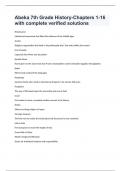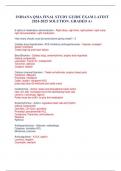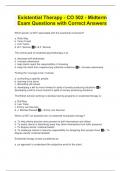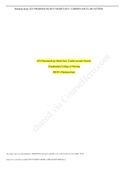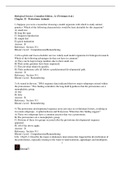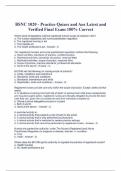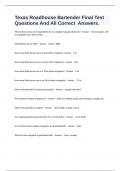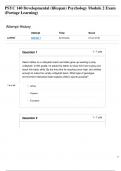ICS Exam Part 2
Week 8 News Production
Mediatization and Media Logic
- CNN effect>news>public opinion>pressure on the government -Global networks have
become a decisive actor in determining policies and outcomes of significant events
- “It suggests that when CNN floods the airwaves with news of a foreign crisis,
policymakers have no choice but to redirect their attention to the crisis at hand. It also
suggests that crisis coverage evokes an emotional outcry from the public to ‘do
something about the latest incident, forcing political leaders to change course or risk
unpopularity” (news have an upper hand in terms of influence)
- The more salient a topic is in the media, the more opportunities exist for citizens to be
informed about it, and hence consider the topic to be important (McCombs &
Shaw,1972).
- Media that are favorably perceived have a stronger agenda-setting effect because citizens
are less likely to counterargue their information.
- The public agenda- how frequently a sample of citizens mentioned a topic as the “most
important problem” in public opinion surveys.
- Political satire- satire that specializes in gaining entertainment from politics (revealing
the underlying truth)
- Agenda-setting- the ability of the news media to influence the importance placed on the
topics of the public agenda; have an impact over topics that are popular(decide how
salient the topic will be to the public).
- Pseudo event- event planned to receive media publicity. Characteristics: dramatic,
planned, marked in time and space, it doesn’t take place without media intervention
- Mediation (communication through media?) should therefore primarily be understood
as opposed to direct, first-hand, or face-to-face communication, whereas mediated
politics primarily should be understood as politics communicated via and experienced
through different media.
- Mediation of politics: whether people, playing different roles within the political
communication system, depend on the media for information and communication with
each other (Strömbäck 2008).
,- Mediatization (Esser and Strömbäck) is a process whereby society to an increasing
degree is submitted to, or becomes dependent on, the media and their logic. A process in
which there is a development toward increasing media influence.
- Media influence other parts of society
- Society is 1. Shaped by media 2. Dependant on media
- Mediatization of politics: a four-dimensional concept:
1. Dimension is concerned with the extent to which the media constitute/make the
most important or dominant source of information and channel of communication.
2. Concerned with the media’s independence from other social institutions, not least
political institutions
3. Concerned with media content—most importantly, news and nonfictional
content—and the degree to which media content is governed by media logic or
political logic.
4. Focuses on political actors and the degree to which they are governed by media
logic or political logic.
- Media interventionism refers to a media-centered political reporting style in which,
increasingly, journalists and media actors become the stories’ main newsmakers rather
than politicians or other social actors (increasing popularity of journalists)
- Media logic: a way through which media present and transmit information(it is important
in which format does the media transmit the information); the power to define who and
what is (politically) relevant lies firmly with the media:
1. Media and media attention are important (mediocracy)
2. Producers of media have their own logic; have ideas of what is important; media wants
to attract viewers
3. Actors(politicians) anticipate on demands from the media (media interventionism?)
4. Media rules displace other considerations (more important to entertain than to inform)
- Media logic - how media perceives, reports on and interprets events
- Form - media formats, production process
- Content - compelling, attention grabbing, dramatic stories
, - Media’s storytelling techniques:
- Simplification
- Polarization
- Intensification
- Personalization
- Visualization
- Stereotyping
- Particular way of framing news
- Political logic: politics ultimately is about collective and authoritative decision making
as well as the implementation of political decisions; processes of distributing political
power; the processes of political deliberation, bargaining, and decision making; the
processes of implementing political decisions; and the question of power (who has the
power) 6 dimensions of political logic?
News Values and News Factors
- a conceptual framework to describe the gatekeeping practices of the mainstream news media
(events are more likely to become news if they fit a specific criteria)
Issue in today’s press: decrease in news consumption/readership of general public
Leads to/consequence: increase of commercial news factors (to make it more appealing)
- News factors: qualities of a text rather than inherent characteristics of an event itself,
- Are applied by the media to heighten the legitimacy of an event becoming news
- The more news factors a story contains, the more newsworthy it is considered and
the higher the likelihood for the event to reach a prominent publication
Week 8 News Production
Mediatization and Media Logic
- CNN effect>news>public opinion>pressure on the government -Global networks have
become a decisive actor in determining policies and outcomes of significant events
- “It suggests that when CNN floods the airwaves with news of a foreign crisis,
policymakers have no choice but to redirect their attention to the crisis at hand. It also
suggests that crisis coverage evokes an emotional outcry from the public to ‘do
something about the latest incident, forcing political leaders to change course or risk
unpopularity” (news have an upper hand in terms of influence)
- The more salient a topic is in the media, the more opportunities exist for citizens to be
informed about it, and hence consider the topic to be important (McCombs &
Shaw,1972).
- Media that are favorably perceived have a stronger agenda-setting effect because citizens
are less likely to counterargue their information.
- The public agenda- how frequently a sample of citizens mentioned a topic as the “most
important problem” in public opinion surveys.
- Political satire- satire that specializes in gaining entertainment from politics (revealing
the underlying truth)
- Agenda-setting- the ability of the news media to influence the importance placed on the
topics of the public agenda; have an impact over topics that are popular(decide how
salient the topic will be to the public).
- Pseudo event- event planned to receive media publicity. Characteristics: dramatic,
planned, marked in time and space, it doesn’t take place without media intervention
- Mediation (communication through media?) should therefore primarily be understood
as opposed to direct, first-hand, or face-to-face communication, whereas mediated
politics primarily should be understood as politics communicated via and experienced
through different media.
- Mediation of politics: whether people, playing different roles within the political
communication system, depend on the media for information and communication with
each other (Strömbäck 2008).
,- Mediatization (Esser and Strömbäck) is a process whereby society to an increasing
degree is submitted to, or becomes dependent on, the media and their logic. A process in
which there is a development toward increasing media influence.
- Media influence other parts of society
- Society is 1. Shaped by media 2. Dependant on media
- Mediatization of politics: a four-dimensional concept:
1. Dimension is concerned with the extent to which the media constitute/make the
most important or dominant source of information and channel of communication.
2. Concerned with the media’s independence from other social institutions, not least
political institutions
3. Concerned with media content—most importantly, news and nonfictional
content—and the degree to which media content is governed by media logic or
political logic.
4. Focuses on political actors and the degree to which they are governed by media
logic or political logic.
- Media interventionism refers to a media-centered political reporting style in which,
increasingly, journalists and media actors become the stories’ main newsmakers rather
than politicians or other social actors (increasing popularity of journalists)
- Media logic: a way through which media present and transmit information(it is important
in which format does the media transmit the information); the power to define who and
what is (politically) relevant lies firmly with the media:
1. Media and media attention are important (mediocracy)
2. Producers of media have their own logic; have ideas of what is important; media wants
to attract viewers
3. Actors(politicians) anticipate on demands from the media (media interventionism?)
4. Media rules displace other considerations (more important to entertain than to inform)
- Media logic - how media perceives, reports on and interprets events
- Form - media formats, production process
- Content - compelling, attention grabbing, dramatic stories
, - Media’s storytelling techniques:
- Simplification
- Polarization
- Intensification
- Personalization
- Visualization
- Stereotyping
- Particular way of framing news
- Political logic: politics ultimately is about collective and authoritative decision making
as well as the implementation of political decisions; processes of distributing political
power; the processes of political deliberation, bargaining, and decision making; the
processes of implementing political decisions; and the question of power (who has the
power) 6 dimensions of political logic?
News Values and News Factors
- a conceptual framework to describe the gatekeeping practices of the mainstream news media
(events are more likely to become news if they fit a specific criteria)
Issue in today’s press: decrease in news consumption/readership of general public
Leads to/consequence: increase of commercial news factors (to make it more appealing)
- News factors: qualities of a text rather than inherent characteristics of an event itself,
- Are applied by the media to heighten the legitimacy of an event becoming news
- The more news factors a story contains, the more newsworthy it is considered and
the higher the likelihood for the event to reach a prominent publication


